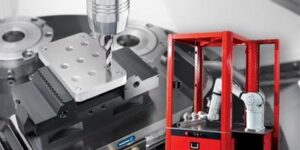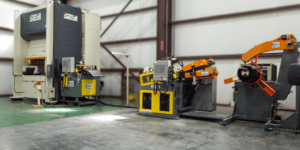No Peril at Merrill
When the economy got mean, Michigan job shop Merrill Tool got lean with flexible, large-part machine tools from MAG that increased their capacity and opened up new market opportunities. Here’s how they did it.
Posted: June 12, 2012
When the economy got mean, Michigan job shop Merrill Tool got lean with flexible, large-part machine tools that increased their capacity and opened up new market opportunities. Here’s how they did it.
Weak economies hit the manufacturing industry hard, especially in Michigan, but machine shops with the flexibility to accommodate change, diversify their customer bases and run lean, efficient operations are well-positioned to survive when times get tough.
Merrill Tool & Machine, a 40-year-old grinding, milling and turning shop headquartered in Merrill, MI, followed a strategy of diversification and lean operations even before the economy began to decline. The shop boasts of flexibility to handle parts under an ounce to more than 50 tons, from under an inch to more than 40 ft. As part of the 400-employee Merrill Technologies Group, the company is sister to Merrill Fabricators, Merrill Engineering & Integration, and Merrill Aviation.
http://youtu.be/GyfuGf6Se98
Merrill Tool president Bob Yackel has steered a course to diversify his customer base so that no segment of industry constitutes more than 20 percent of the company’s sales, focusing on aerospace/defense, machinery-build, automotive, heavy equipment, and oil field as key markets, while rapidly expanding their work in the emerging wind/solar energy sector.
As a two-shift contract shop with a high proportion of large-part work, the company constantly fine tunes its machining strategies and capabilities to make margins on large-part lots as small as one.
Tuning up its capacity for an increase in oil-field work, for example, Merrill purchased a MAG RT 1600 boring mill off the floor at IMTS 2006. This increase continued with a second similar boring mill, two vertical turning centers with 2 m tables and, most recently, a horizontal machining center with twin 1250 mm pallets – all acquired between late 2006 and early 2009 at a total investment of approximately $7 million.
http://youtu.be/NQhV0vZAVdQ
The first rotary-table horizontal boring mill immediately replaced three retrofitted boring mills and, in doing so, increased part processing capacity and reduced machining time by as much as 34 percent. “We purchased our first boring mill to handle new work involving some very large valve parts,” notes Yackel. “The capacity of the rotary table, W-axis travel and overall technology are the main reasons we bought that machine. We also liked that it was made in the U.S. and immediately available, because we had an immediate need.”
The RT 1600 has a fully programmable 1600 mm x 2500 mm (63.0 in x 98.4 in) contouring rotary table capable of handling parts up to 25,000 kg (55,100 lb), which has helped reduce cycle times by providing the ability to machine four sides of the workpiece without re-fixturing.
There are four options for the W-axis saddle travel – 1500 mm (59.0 in), 2000 mm (78.7 in), 2500 mm (98.4 in) and 3500 mm 137.8 in) – and the single-piece cast bed, with a wide 1310 mm (51.6 in) way spread, adds to the machine’s rigidity and accuracy.
“We’ve used the RT 1600 to machine parts up to 42,000 lb in one setup,” explains Yackel. “It holds bore locations to ±0.0005 in, and we can program offline for even better chip-to-chip times.” Merrill also uses spindle probes for setup and post-process measurement.
The company added a second RT 1600 in December of 2008 to provide increased machining capacity for a new wind energy customer, a growing part of Merrill’s industry mix. Manufacture of wind energy parts is now approximately 10 percent of the shop’s business, where it was zero percent just five years ago.
“We’d like to see wind energy grow to be about 20 percent of our overall business, which is our maximum target for any industry we serve,” said Yackel. “Just like in the stock market, we consider diversification a key strategy to long-term health of the company.”









